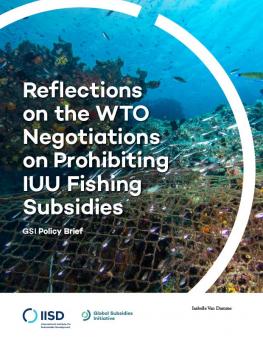
Reflections on the WTO Negotiations on Prohibiting IUU Fishing Subsidies
This policy brief discusses some of the legal issues that have emerged in the negotiation of a new rule on subsidies to illegal, unreported and unregulated fishing in the context of the World Trade Organization negotiations on fisheries subsidies.
Key Messages
- Negotiations at the World Trade Organization on fisheries subsidies include an important rule designed to eliminate the subsidies provided to illegal, unreported and unregulated fishing.
- This rule could usefully build on existing definitions and obligations that governments have adopted under the international law of the sea. It could also flexibly reflect the variations in how governments control fisheries without introducing so much deference that the subsidy obligation becomes difficult to enforce.
This policy brief explores some of the legal questions that have emerged in the negotiations at the World Trade Organization (WTO) about a new rule that would prohibit subsidies from being provided to fishers that have engaged in illegal, unreported and unregulated (IUU) fishing. The brief discusses how IUU fishing could be defined in the context of a WTO agreement with reference to the Food and Agriculture Organization of the UN's International Plan of Action on IUU fishing and explores the flexibility inherent in the plan.
The brief examines the various options for who might make a determination of IUU fishing and under what due process conditions. This is a crucial step in the construction of a WTO rule because an IUU determination would trigger a WTO member's obligation to stop subsidizing. It argues that a broad approach that allows governments to make determinations in whatever capacity is relevant in a particular circumstance (e.g., in their capacity as coastal or flag states) would help to ensure that the discipline is effective. It also argues that due process conditions should be drafted to apply to the process by which determinations are made to ensure fairness vis-à-vis other members but should not apply to a government's choice of what circumstances warrant a determination. The brief also reviews options that would limit the application of the prohibition and suggests that clarity regarding the duration of the subsidy prohibition might be helpful.
You might also be interested in
Source to Sea: Integrating the water agenda in 2023
2023 could prove to be a definitive year for facilitating an integrative perspective on water issues, from fresh water to the marine environment.
S'pore becomes 2nd country to support global agreement ending harmful fisheries subsidies
Singapore has become the second member of the World Trade Organisation (WTO) to ratify its agreement to protect the world’s oceans. On Friday, the Republic formally accepted the treaty – the first multilateral trade agreement that focuses on environmental sustainability – becoming the first coastal state to do so.
World Trade Organization Talks on Subsidies that Contribute to Overcapacity and Overfishing: What's on the table?
World governments are currently negotiating new global disciplines to curb harmful fisheries subsidies. What new rules are being proposed?
Landmark Agreement Curbing Harmful Fisheries Subsidies Awaits Ratification A Year After Adoption
This month marks the first anniversary of the World Trade Organization’s (WTO) historic Agreement on Fisheries Subsidies. The treaty, adopted at the WTO's 12th Ministerial Conference, established the first global, legally binding framework that limits subsidies for illegal, unreported and unregulated (IUU) fishing and fishing of overfished stocks, as well as subsidies to vessels fishing on the unregulated high seas. The agreement also calls for countries to exercise “due restraint” in providing subsidies to vessels that do not fly their country’s flag or those that fish stocks with unknown status.